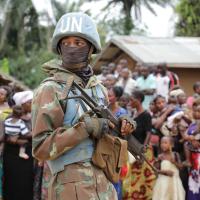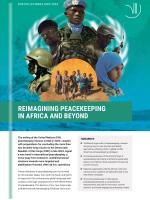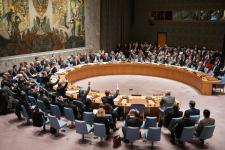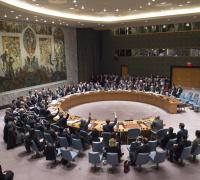Reimagining peacekeeping in Africa and beyond

Traditional, large-scale UN peacekeeping missions are giving way to more focused and flexible approaches, reflecting shifts in global conflict dynamics and peacekeeping strategies.
Increasing awareness of the shortcomings of peacekeeping, particularly at achieving sustainable peace, is prompting critical evaluations of past and current missions.
Regional organisations like the African Union and various ad hoc coalitions are taking the lead in new intervention strategies.
The evolving landscape of international peacekeeping demands a comprehensive reassessment, and calls for innovative, context-sensitive, and locally engaged peacekeeping models.
The ending of the United Nations (UN) peacekeeping mission in Mali in 2023, coupled with preparations for concluding the more than two decades-long mission in the Democratic Republic of the Congo (DRC) in late 2024, signal a new trend in international peacekeeping: a move away from extensive, multidimensional missions towards more targeted and stabilisation-focused, often ad hoc, operations.
These milestones in peacekeeping point to the need for UN member states, from both the South and North, to respond to the contemporary global landscape and conduct a thorough reassessment of the effectiveness of peacekeeping. The absence of any new, large-scale, multidimensional peacekeeping initiatives since such missions were deployed in South Sudan (2011), Mali (2013) and the Central African Republic (2014) further emphasises the uncertain future of peacekeeping.
There is a growing recognition that these operations have failed to meet expectations and achieve their intended objectives of establishing lasting and equitable peace where they deploy. This realisation, together with a crisis of consent from host states, has led to waning confidence in and enthusiasm for such interventions among the international community. Alongside a declining belief in the ‘liberal world order’ primarily advanced by governments and practitioners in Europe and North America, this underscores a deep-seated change in the field of international peacekeeping.
On the one hand there is a need to adapt and critically assess almost six decades of peacekeeping, as highlighted in the UN’s New Agenda for Peace, including the political and ideological basis upon which this form of intervention stands. Indeed, peacekeeping has not only attempted to respond to the changing nature of conflict, especially after the Cold War, it has also directly contributed to existing inequalities globally and represented an increasingly violent form of intervention from its traditional point of departure.
On the other hand, with UN-led peacekeeping missions (possibly) phasing out, it is crucial to also critically analyze the new forms of intervention that are emerging. Their suitability for the diverse operational challenges encountered must be assessed, especially in Africa where most UN missions have been deployed, often led by the African Union (AU) or through ad hoc coalitions that sometimes operate beyond UN and AU mandates.
Shifting mission types
Peacekeeping as a form of intervention has gone through several changes, with the end of the Cold War representing a particular watershed. Initially the primary focus of peacekeeping operations was ‘only’ to impartially uphold ceasefires among conflicting parties that had consented to pause hostilities. However, throughout the 1990s and 2000s peacekeeping missions were increasingly called upon for more robust approaches and broadened their scope to embrace comprehensive peace- and state-building objectives, striving to nurture stability and governance practices in nations recovering from conflict, guided by the ideals of liberal democracy. The AU’s African Peace and Security Architecture, which endorsed a range of conflict prevention tools unforeseeable in the AU’s predecessor, the Organisation of African Unity, emerged in this global context.
As crises grew more complex, the mandates of peacekeeping missions expanded correspondingly. This led to significant gaps between expectations and achievements, and between principles and realities, on the ground. In sum, peacekeeping fell short of its intended, perhaps unrealistic, goal of establishing lasting peace and liberal-democratic states across Africa. Missions in active conflict zones like DRC and Mali that lacked the requisite capabilities and strayed from traditional peacekeeping’s foundational principles—securing the consent of conflicting parties, maintaining impartiality, and limiting the use of force—exemplify these challenges.
In sum, we have witnessed not just a shift in worldviews, but also a fundamental change in the character of peacekeeping operations themselves.
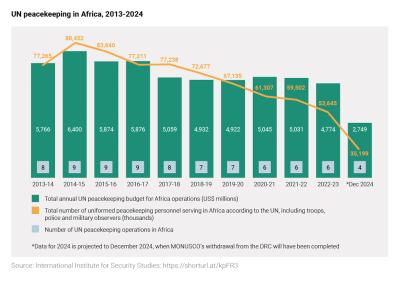
Geopolitical dynamics in the UN Security Council
Tensions and divergent interests among members of the UN Security Council (UNSC) have also presented significant barriers to the establishment of new peacekeeping missions. In an era increasingly marked by geopolitical enmity and regional conflicts, notably in Europe and the Middle East, achieving consensus among permanent UNSC members has become increasingly challenging. Political disagreements and strategic rivalries, particularly in the context of the ongoing war between Russia and Ukraine, impede the consensus necessary for authorising new peacekeeping endeavours, while sharp divisions over human rights and gender questions in the UNSC have undermined the UN’s normative framework.
Regional solutions In a context of dwindling faith in peacekeeping other forms of intervention have emerged. A notable trend is the growing emphasis on regional and national actors as the primary stakeholders in conflict resolution. For example, the AU has actively engaged in peace operations in Somalia, while authorising regional ad hoc coalitions with both external funding and robust, militarily-focused mandates. This illustrates the increased involvement of regional organisations in attempting to address conflicts within their own areas, despite facing the same challenges in achieving sustained peace as the UN does.
These approaches indicate a significant move away from long-term, UN-led, multilateral operations with broad objectives of keeping and building peace and towards short-term, rapid reaction missions that aim to counter terrorism or insurgencies, marking a new chapter in the continent’s approach to peace and conflict resolution. The full implications of this shift remain to be seen and thoroughly understood.
While regional—and national—approaches in theory offer contextual understanding and localised solutions, they also present challenges in terms of self-serving interests, coordination and sustainability. Instances of troop-contributing countries pursuing their national interests at the expense of mission cohesion, as observed in Mali (UN) and Somalia (AU), underscore the complexities inherent in such approaches.
Ad hoc coalitions
Ad hoc coalitions have surfaced as seemingly agile and flexible alternatives to traditional peacekeeping, crafted to tackle distinct security challenges and contingent upon achieving political consensus among participating member states. These coalitions, such as the Multinational Joint Task Force (MNJTF) against Boko Haram and the, initially French-led, G5 Sahel Joint Force, showcase a shift towards more informal, on-demand counterterrorism efforts. While the MNJTF, comprising forces from five countries around the Lake Chad Basin, is targeting Boko Haram without a direct mandate but with AU authorisation, the G5 Sahel Force, despite also having AU approval, struggled with cohesion and ultimately disbanded following military coups in four of its five member states.
The ad hoc nature of initiatives like these raises questions about their long-term sustainability in terms of resources, commitment and planning for extended operations. Additionally, the legitimacy, transparency and accountability of these coalitions are crucial concerns. For instance, who authorises the formation of such coalitions and is it clear how resources are allocated?
This query touches on deep-seated concerns. In the West, there is an obvious sense of loss of control. Among African governments, there is a significant concern to maintain—or gain—sovereignty over internal matters. Furthermore, African states find themselves in a predicament, struggling to manage security issues within their borders while feeling overlooked and often exploited by the broader international community, not least the West.
Unlike the UN, the mechanisms through which ad hoc coalitions are organised and overseen are significantly more opaque, making it difficult to assess them comprehensively.
The capacity of AU member states to regulate their own actions, the mechanisms at their disposal for such self-regulation, and the diminishing desire of Western nations to act as global enforcers are pressing questions and concerns, depending on who is asked. Given the decline in French and US influence in the Sahel, it becomes evident that alternative forms of engagement are emerging, in some cases even needed, and more often than not inevitable.
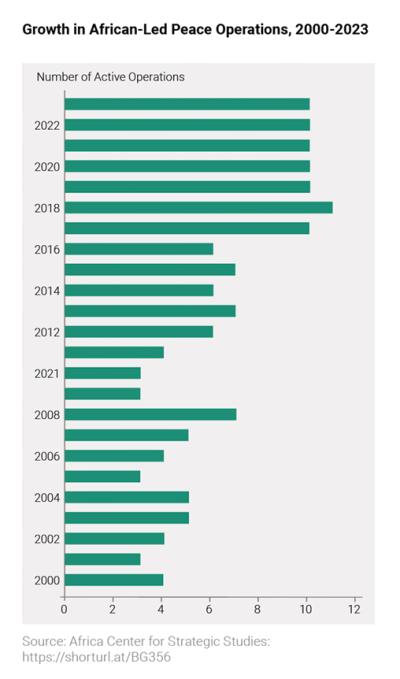
Rethinking peacekeeping is a must
The transition towards regional, national, and ad hoc coalition strategies, in lieu of traditional UN-led peacekeeping, underscores a critical juncture in the evolution of international security efforts. This shift, driven by the increasing extent and complexity of peacekeeping in the post-Cold War era, calls for a profound re-evaluation of the foundational principles that have guided peacekeeping in the last decades. The ambiguity surrounding the efficacy of these emergent approaches demands a recalibration of what constitutes effective peacekeeping—or peacekeeping at all—and calls for strategies that are not only innovative but also more consistently rooted in and shaped by the realities of conflict-affected regions.
Direct engagement with communities entrenched in conflict emerges as a crucial strategy, aimed to make peacekeeping efforts both relevant and impactful by addressing the nuanced needs and aspirations of these populations directly. Simultaneously, the AU should lead in championing solutions that are inherently African, rather than led by universal (i.e. Western) principles. Until now, the emphasis on AU leadership has been more rhetorical than grounded in actual practices of implementation and direction, which have often been led by states outside the continent.
To truly advance an African agenda, AU member states must play their part, politically, economically and strategically, and shape peacekeeping initiatives accordingly. This is the only way to ensure that peacekeeping efforts are not only responsive to the specific needs and concerns of communities affected by conflict, but also to promote their long-term political sustainability. Equally important; states from outside the continent, particularly in Europe and North America, must take a step back and refrain from the typical Western approach of believing that they have the answers to the conflicts of others – even as China and Russia increasingly do.
These suggestions are not necessarily new. They are, however, a call for a new peacekeeping practice, because the alternative—no peacekeeping as we know it, in any shape or form—may not be desirable either.
DIIS Experts


